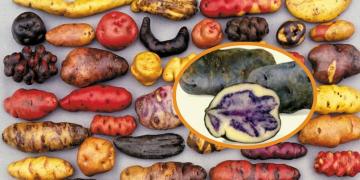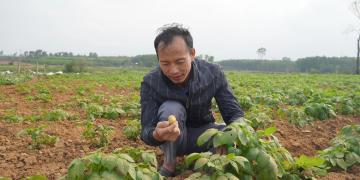Spain: COAG accuses the distributor of delaying the purchase of Spanish potatoes to "pressure" prices.
COAG has denounced the "distribution chains" flooding shelves with potatoes from Israel and Egypt in the midst of the new potato campaign in Murcia and Andalusia "to delay the purchase of domestic produce, saturate the market, and force a decline in

In a statement, the agricultural organization lamented that "while Spanish new potatoes are beginning to emerge from the fields with all their freshness and quality," large retail chains are opting for potatoes imported from Israel and Egypt (80,000 tons in 2024).
According to COAG’s potato manager, Alberto Duque, this is "a calculated strategy to delay the purchase of domestic products, saturate the market, and force down prices at source."
In his opinion, the result is that consumers are "forced" to make the typical potato omelet with raw materials from the Middle East, while "quality local produce is in the sacks."
"It’s unreasonable to find ’Origin Israel’ potatoes in a commercial area of Campo de Cartagena, with 10,000 hectares planted," he lamented.
From the main new potato-producing areas of Spain (Seville, Malaga, and Campo de Cartagena), it is confirmed that "currently, supply is sufficient to consistently meet the demand of the main distribution chains," COAG stated.
And they have insisted that it is incomprehensible "that native potatoes, with a quality seal and EU standards, are being sidelined on the shelves in the face of imports from third countries."
The COAG, which has announced that it will report this situation to the Ministry and the competent regional authorities, has added that there is a "generalized presence of storage potatoes from France," which have been harvested since November and have already lost much of their organoleptic qualities after storage in cold storage.
In figures, COAG has warned that this strategy jeopardizes 4.2 million rural working days, while releasing an additional 3,376 tons of CO2 into the atmosphere through international transport, the equivalent of the emissions from 10,683 round-trip flights per person on the Madrid-Paris route.
The distribution considers the accusations unfounded
Sources in the food distribution sector have told Efeagro that the accusations made by COAG are "unfounded and create unnecessary noise" and are due more to the "difficult" start to the Spanish potato campaign, which is focused on Andalusia and continues in the Region of Murcia.
They explained that the new potato season in Andalusia has started later than previous years and with lower production due to the persistent rains of recent months, which, in some areas, has caused damage to up to 25% of farms.
In the case of Campo de Cartagena, they have indicated that production is still very low and, currently, only potatoes unsuitable for washing are being harvested, which is what supermarkets sell.
According to distribution, most suppliers are targeting May as the likely harvest date for potatoes with sufficient volume and quality to be marketed to food distribution companies.
They regretted that these accusations also generate "distrust among consumers in the Spanish agri-food system, an objective contrary to that pursued by the National Food Strategy recently presented by the Ministry of Agriculture and Food.
Concern shared with exporters
The Spanish Federation of Fruit and Vegetable Producers and Exporters (Fepex) has expressed concern about the growing import of this product, primarily from third countries, it told Efeagro.
According to Fepex, this is a problem the organization has already warned about; last December, producers noted the "sharp increase in Spanish potato imports, especially those from Egypt," with a growth of 1,958% in the last five years, according to their own data.
The latest data from the Customs and Excise Department, processed by Fepex, show that potatoes were the most imported product by Spain in January, with 124,258 tons (down 1%) and €53 million (down 4.5%).
Evolution of trade
So far this season, Spain has exported a total of 20,618 tons of potatoes, representing a 0.6% increase compared to last year and a 20.4% increase compared to the average of the last five years, according to data from the Ministry of Agriculture, Fisheries, and Food (MAPA).
According to the Department, there has been a "slight" increase in shipments to countries within the European Union (+0.9% compared to 2024), and exports to Portugal are growing (+3.7%), while they are declining to France (-18.2%), both of which are major markets.
Regarding imports, official data, updated to January of this year, show a 3% decrease compared to the previous campaign, although they have grown by 17.4% compared to the average of the last five seasons.
Fuente:




